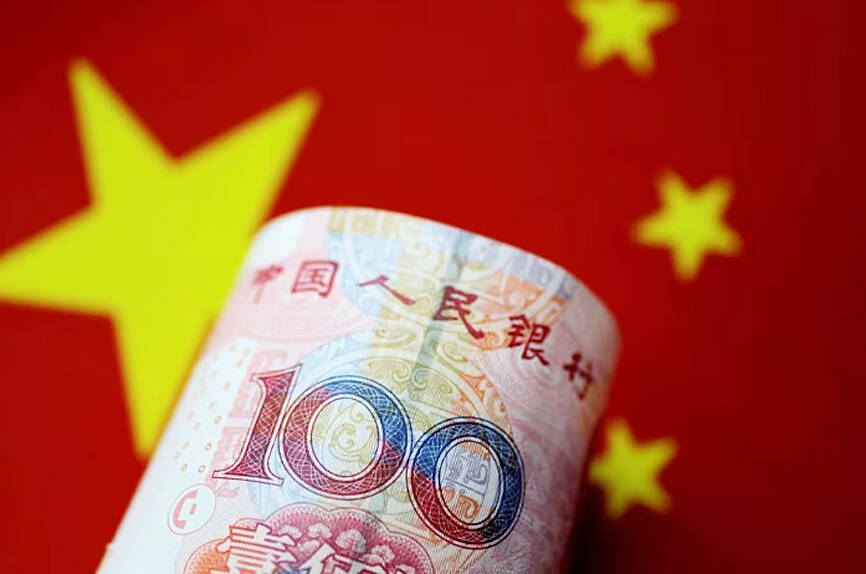The Ministry of Justice Investigation Bureau (MJIB) is tracking the movement of money from foreign sources to prevent Chinese funds from being used to interfere in the presidential and legislative elections on Jan. 13, sources said yesterday.
The bureau’s Anti-Money Laundering Division is monitoring channels through which foreign money flows into Taiwan, such as underground remittance services, sources familiar with the matter said.
The effort is targeting offshore funding used to increase the click-through rate of online influencers, and support specific candidates and temple charity events, the sources said.

Photo: Reuters
Some online opinion leaders who have gained notoriety by commenting on political issues publish content that attacks Taiwan, or is pro-Beijing, unverified or controversial to gain assistance and donations from Chinese supporters, they said, adding that the actions support China’s “cognitive warfare” tactics.
The bureau is closely monitoring controversial online personalities or the marketing companies behind them to determine if they receive money from suspicious sources, they said.
When suspicious funding is detected, the agencies trace the money and provide cash transaction reports and suspicious transaction reports to help prosecutors investigate such cases, they said.
Chinese election-interference strategies also include buying advertisements through third parties in Taiwan, such as supporters’ associations and foundations, or using temple charity events as a pretense for vote-buying, they said.
Funding for such efforts might be transferred through underground remittance or money laundering schemes using cryptocurrencies, the sources said.
The bureau is working with local prosecutors to share information regarding such cases, they said.
Lo Cheng-chung (羅承宗), a professor and director of Southern Taiwan University of Science and Technology’s Institute of Financial and Economic Law, yesterday said that authorities should target “upstream” funding sources to prevent foreign actors from spreading disinformation through online influencers.
Regulations that have been put in place to prevent foreign actors from interfering in the nation’s radio, television and publishing industries cannot effectively regulate behavior on social media, Lo said.
A large amount of false information is spread online, preventing the public from receiving accurate and complete information, which poses a serious threat to democracy, he said.
France has passed legislation to fight online misinformation, while Germany has passed the Network Enforcement Act to combat false news online and the EU passed the Digital Services Act to protect the rights of digital users, which demonstrates the necessity for legislation to prevent disinformation, he said.
The Securities Investment Trust and Consulting Act (證券投資信託及顧問法) has been amended to regulate online influencers creating content related to investments and holding online platforms accountable for fraud that harms investors, Lo said.
To combat disinformation, Taiwan should follow the example of the EU to require platform operators to be transparent and disclose where their funding comes from, which would reveal which influencers are “paid to talk,” he said.

TRUST: The KMT said it respected the US’ timing and considerations, and hoped it would continue to honor its commitments to helping Taiwan bolster its defenses and deterrence US President Donald Trump is delaying a multibillion-dollar arms sale to Taiwan to ensure his visit to Beijing is successful, a New York Times report said. The weapons sales package has stalled in the US Department of State, the report said, citing US officials it did not identify. The White House has told agencies not to push forward ahead of Trump’s meeting with Chinese President Xi Jinping (習近平), it said. The two last month held a phone call to discuss trade and geopolitical flashpoints ahead of the summit. Xi raised the Taiwan issue and urged the US to handle arms sales to

A magnitude 5.6 earthquake struck off the coast of Yilan County at 12:37pm today, with clear shaking felt across much of northern Taiwan. There were no immediate reports of damage. The epicenter of the quake was 16.9km east-southeast of Yilan County Hall offshore at a depth of 66.8km, Central Weather Administration (CWA) data showed. The maximum intensity registered at a 4 in Yilan County’s Nanao Township (南澳) on Taiwan’s seven-tier scale. Other parts of Yilan, as well as certain areas of Hualien County, Taipei, New Taipei City, Taoyuan, Hsinchu County, Taichung and Miaoli County, recorded intensities of 3. Residents of Yilan County and Taipei received

Taiwan has secured another breakthrough in fruit exports, with jujubes, dragon fruit and lychees approved for shipment to the EU, the Ministry of Agriculture said yesterday. The Animal and Plant Health Inspection Agency on Thursday received formal notification of the approval from the EU, the ministry said, adding that the decision was expected to expand Taiwanese fruit producers’ access to high-end European markets. Taiwan exported 126 tonnes of lychees last year, valued at US$1.48 million, with Japan accounting for 102 tonnes. Other export destinations included New Zealand, Hong Kong, the US and Australia, ministry data showed. Jujube exports totaled 103 tonnes, valued at

BIG SPENDERS: Foreign investors bought the most Taiwan equities since 2005, signaling confidence that an AI boom would continue to benefit chipmakers Taiwan Semiconductor Manufacturing Co’s (TSMC, 台積電) market capitalization swelled to US$2 trillion for the first time following a 4.25 percent rally in its American depositary receipts (ADR) overnight, putting the world’s biggest contract chipmaker sixth on the list of the world’s biggest companies by market capitalization, just behind Amazon.com Inc. The site CompaniesMarketcap.com ranked TSMC ahead of Saudi Aramco and Meta Platforms Inc. The Taiwanese company’s ADRs on Tuesday surged to US$385.75 on the New York Stock Exchange, as strong demand for artificial intelligence (AI) applications led to chip supply constraints and boost revenue growth to record-breaking levels. Each TSMC ADR represents